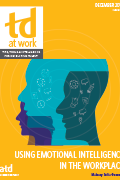The Public Manager Magazine Article
Improving Performance With EQ
The personal and social skills that make up emotional intelligence can bring greater workplace success.
Tue Jan 10 2017

"It is imperative for leaders to demonstrate emotional intelligence. Leaders with strong emotional intelligence affect not only their own team, but the culture of the organization as a whole," writes Meloney Sallie-Dosunmu in the December 2016 issue of ATD's TD at Work, "Using Emotional Intelligence in the Workplace."
Emotional intelligence, or EQ, refers to both personal and social skills. Among the specific EQ competencies are self-awareness, self-regulation, motivation, empathy, and social skills. EQ is being talked about more these days because in our fast-paced, ever-changing, increasingly global work world, you need flexibility to change, optimism, understanding of others, and the ability to leverage diversity—all of which are part of the EQ competencies. For the government workforce, further qualities that are especially crucial include a service orientation, pursuit of noble goals, and commitment; and for managers, the qualities of achievement, drive, empathy, ability to build bonds, and being a change catalyst are also key.
After learning about and coming to understand EQ, the next steps toward becoming more emotionally intelligent, according to Sallie-Dosunmu, are identifying your current level of EQ performance and creating a development plan. For managers, determining such levels and developing a plan can be both at the personal level and relative to one's direct reports.
For individuals to truly embrace EQ, they must understand what's in it for them and what EQ looks like. On the former, it is interesting to note that EQ expert Travis Bradberry says that people with a high degree of EQ earn more money than those with lesser degrees of EQ—an average of $29,000 more per year. To show what EQ looks like in action, talent developers may want to use case studies, role play, or videos in their training.
As outlined in the TD at Work, some of the ways you can raise your own EQ—or that of your team members—include:
keeping a journal to check in with yourself and your beliefs and feelings about events in your life
learning to better manage powerful feelings, specifically anger and anxiety, by using such tools as visualization and focusing on your breathing
getting an EQ buddy who can shed light on how you behave in the workplace.
In the work setting, EQ encourages an appreciation for diversity and inclusion. As Sallie-Dosunmu writes, "Leaders who are strong at self-regulation not only recognize their biases, but are intentional about reaching out to connect with diverse employees and encourage their participation." EQ also helps in the areas of engagement and with the use of technology, for example in the use of social media.
